
Shakespeare Sonette
Ich habe zu den von meinem Freund Hans-Werner Scharf neu übersetzten Shakespeare-Sonetten 44 Bilder für ein gemeinsames großformatiges Buch gefertigt, das in diesem Herbst (2013) im Verlag Düsseldorf University Press (dup) erscheint (William Shakespeare, Mine eye hath played the painter / Mein Auge mimt den Maler).
Im Folgenden sind die Bilder sowie der dazugehörige englische Originaltext abgebildet.
Die Navigation durch die Galerie erfolgt auch hier über eine seitliche Maus-/Wischbewegung oder über die Pfeiltasten der Tastatur.
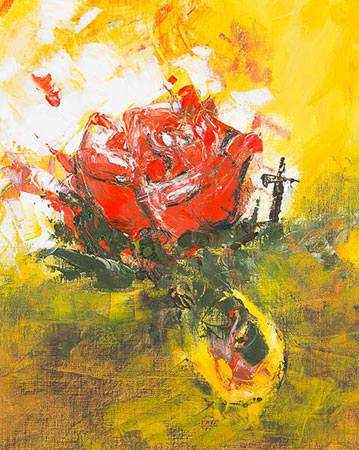
Sonett 1
From fairest creatures we desire increase,
That thereby beauty´s rose might never die,
But as the riper should by time decease
His tender heir might bear his memory:
But thou, contracted to thine own bright eyes,
Feed´st thy light´s flame with self-substantial fuel,
Making a famine where abundance lies,
Thy self thy foe, to thy sweet self too cruel.
Thou that art now the world´s fresh ornament,
And only herald to the gaudy spring,
Within thine own bud buriest thy content,
And, tender churl, mak´st waste in niggarding:
Pity the world, or else this glutton be,
To eat the world´s due, by the grave and thee.
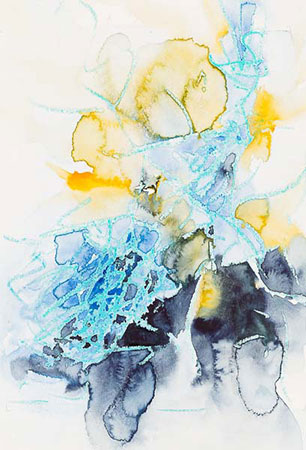
Sonett 2
When forty winters shall besiege thy brow,
And dig deep trenches in thy beauty´s field,
Thy youth´s proud livery so gazed on now
Will be a tattered weed of small worth held:
Then, being asked where all thy beauty lies,
Where all the treasure of thy lusty days,
To say within thine own deep-sunken eyes
Were an all-eating shame, and thriftless praise.
How much more praise deserved thy beauty´s use
If thou couldst answer `This fair child of mine
Shall sum my count, and make my old excuse´,
Proving his beauty by succession thine.
This were to be new made when thou art old,
And see thy blood warm when thou feel´st it cold.
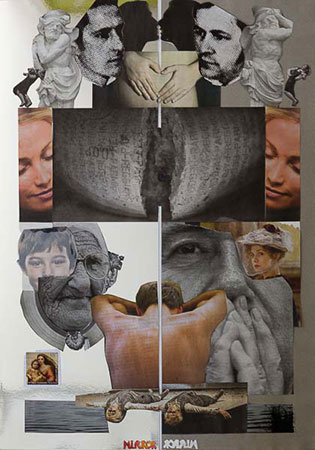
Sonett 3
Look in thy glass and tell the face thou viewest
Now is the time that face should form another,
Whose fresh repair if now thou not renewest
Thou dost beguile the world, unbless some mother.
For where is she so fair whose uneared womb
Disdains the tillage of thy husbandry?
Or who is he so fond will be the tomb
Of his self-love to stop posterity?
Thou art thy mother´s glass, and she in thee
Calls back the lovely April of her prime;
So thou through windows of thine age shalt see,
Despite of wrinkles, this thy golden time.
But if thou live rememb´red not to be,
Die single, and thine image dies with thee.
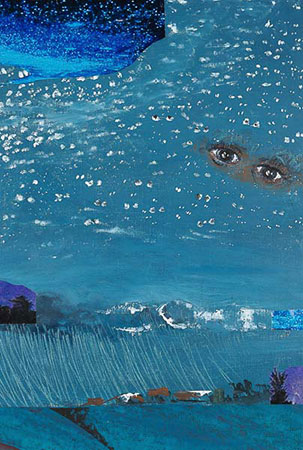
Sonett 14
Not from the stars do I my judgement pluck,
And yet methinks I have astronomy,
But not to tell of good or evil luck,
Of plagues, of dearths, or seasons´ quality;
Nor can I fortune to brief minutes tell,
Pointing to each his thunder, rain, and wind,
Or say with princes if it shall go well
By oft predict that I in heaven find.
But from thine eyes my knowledge I derive,
And, constant stars, in them I read such art
As truth and beauty shall together thrive
If from thyself to store thou wouldst convert:
Or else of thee this I prognosticate,
Thy end is truth´s and beauty´s doom and date.
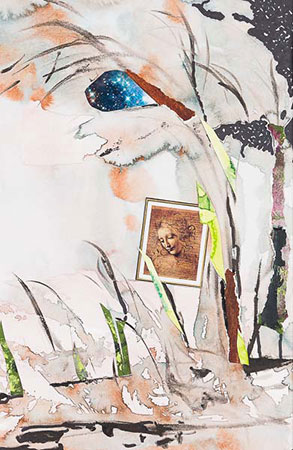
Sonett 15
When I consider every thing that grows
Holds in perfection but a little moment;
That this huge stage presenteth nought but shows,
Whereon the stars in secret influence comment;
When I perceive that men as plants increase,
Cheerèd and checked even by the selfsame sky,
Vaunt in their youthful sap, at height decrease,
And wear their brave state out of memory;
Then the conceit of this inconstant stay
Sets you most rich in youth before my sight,
Where wasteful time debateth with decay
To change your day of youth to sullied night,
And, all in war with Time for love of you,
As he takes from you, I engraft you new.
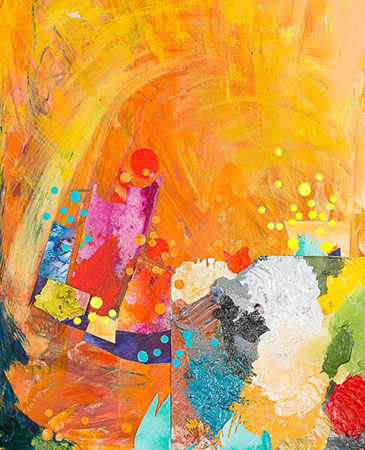
Sonett 18
Shall I compare thee to a summer´s day?
Thou art more lovely and more temperate:
Rough winds do shake the darling buds of May,
And summer´s lease hath all too short a date;
Sometime too hot the eye of heaven shines,
And often is his hold complexion dimmed,
And every fair from fair sometime declines,
By chance or nature´s changing course untrimmed:
But thy eternal summer shall not fade,
Nor lose possession of that fair thou ow´st;
Nor shall Death brag thou wand´rest in his shade,
When in eternal lines to time thou grow´st.
So long as men can breathe or eyes can see,
So long lives this, and this gives life to thee.
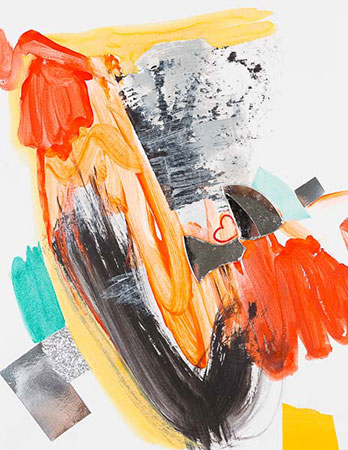
Sonett 22
My glass shall not persuade me I am old,
So long as youth and thou are of one date,
But when in thee time´s furrows I behold,
Then look I death my days should expiate.
For all that beauty that doth cover thee
Is but the seemly raiment of my heart,
Which in thy breast doth live, as thine in me.
How can I then be elder than thou art?
O therefore, love, be of thyself so wary
As I, not for myself, but for thee will,
Bearing thy heart which I will keep so chary
As tender nurse her babe from faring ill.
Presume not on thy heart when mine is slain:
Thou gav´st me thine not to give back again.
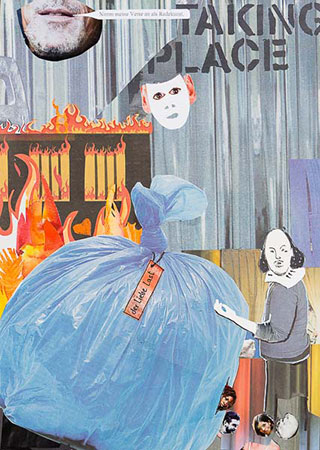
Sonett 23
As an unperfect actor on the stage,
Who with his fear is put besides his part,
Or some fierce thing replete with too much rage,
Whose strength´s abundance weakens his own heart;
So I, for fear of trust, forget to say
The perfect ceremony of love´s rite,
And in mine own love´s strength seem to decay,
O´er-charged with burden of mine own love´s might:
O let my books be then the eloquence
And dumb presagers of my speaking breast,
Who plead for love, and look for recompense,
More than that tongue that more hath more expressed.
O learn to read what silent love hath writ:
To hear with eyes belongs to love´s fine wit.
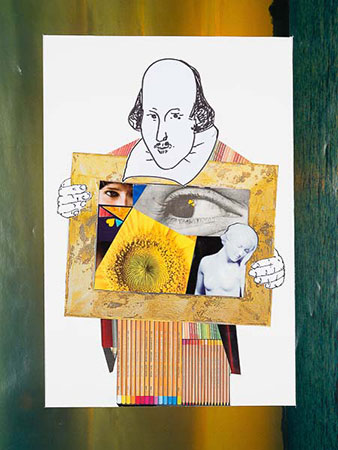
Sonett 24
Mine eye hath played the painter and hath stelled
Thy beauty´s form in table of my heart;
My body is the frame wherein ´tis held,
And perspective it is best painter´s art,
For through the painter must you see his skill
To find where your true image pictured lies,
Which in my bosom´s shop is hanging still,
That hath his windows glazèd with thine eyes.
Now see what good turns eyes for eyes have done:
Mine eyes have drawn thy shape, and thine for me
Are windows to my breast, wherethrough the sun
Delights to peep, to gaze therein on thee.
Yet eyes this cunning want to grace their art:
They draw but what they see, know not the heart.
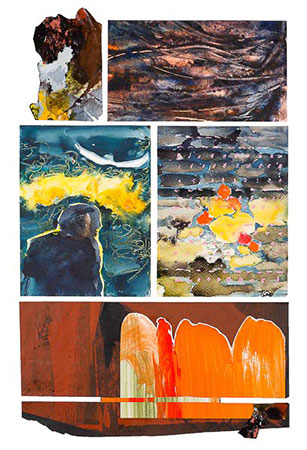
Sonett 37
As a decrepit father takes delight
To see his active child do deeds of youth,
So I, made lame by Fortune´s dearest spite,
Take all my comfort of thy worth and truth.
For whether beauty, birth, or wealth, or wit,
Or any of these all, or all, or more,
Entitled in thy parts do crownèd sit,
I make my love engrafted to this store.
So then I am not lame, poor, nor despised,
Whilst that this shadow doth such substance give
That I in thy abundance am sufficed,
And by a part of all thy glory live.
Look what is best, that best I wish in thee;
This wish I have, then ten times happy me.
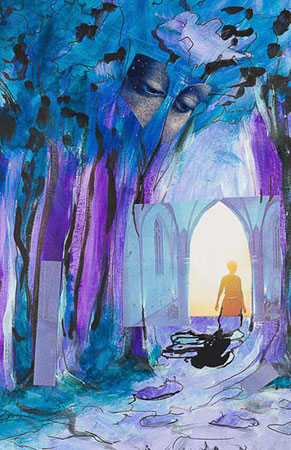
Sonett 43
When most I wink, then do mine eyes best see,
For all the day they view things unrespected,
But when I sleep, in dreams they look on thee,
And, darkly bright, are bright in dark directed.
Then thou, whose shadow shadows doth make bright,
How would thy shadow´s form form happy show
To the clear day with thy much clearer light,
When to unseeing eyes thy shade shines so?
How would (I say) mine eyes be blessèd made
By looking on thee in the living day,
When in dead night thy fair imperfect shade
Through heavy sleep on sightless eyes doth stay?
All days are nights to see till I see thee,
And nights bright days when dreams do show thee me.